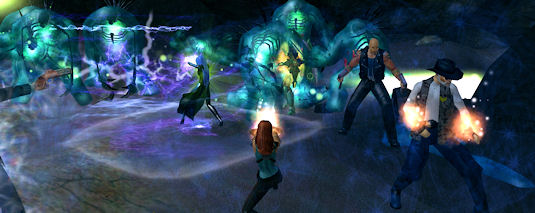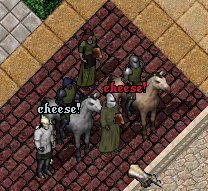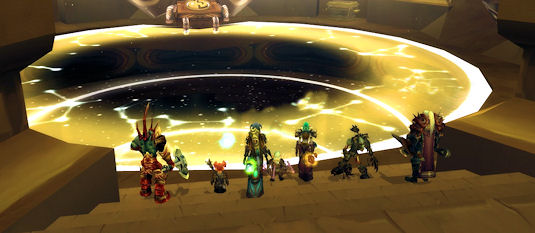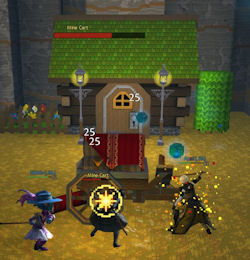
Karen Bryan, Massively’s wonderfully level-headed guild and family columnist, recently wrote about the problem of absent guild leaders in modern MMOs. I certainly have no plans to quibble with her conclusion; she is absolutely correct when she says that modern MMOs have created complicated systems of ranks and privileges and achievements for guilds without also creating effective tools for dealing with absent leadership, meaning that a single person can disappear and leave dozens or hundreds of folks without any recourse for taking control of what they perceive as an asset to be owned, not just a group of fellow players.
The way I see it, there’s a second solution to this problem: Stop designing guilds to be complicated systems of ranks and privileges and achievements in the first place.
 Let’s wander back to the days of yore. When Ultima Online launched, there was no such thing as a guild. Groups of players banded together, of course; you picked a color for all your clothes and a bank to gather at, and the most dedicated clanmates appended their guild abbreviations to their character names (like Mochismo-DE). But there was no guild chat or achievement ladder for being in a guild. As in the real world, socializing was its own reward. Eventually, UO caught up to the shooters and MUDs that had come before it and took a stab at supporting player groups with guildstones, which basically gave you a guild tag, some messages when important things happened, basic ranks, and later, alliances and guild wars. It was utterly simple. If your leader turned out to run a secret ganker character on the side, or if your leader disappeared for a month because of a gambling addiction — both of which happened in my UO guilds! — well, you simply bought a new stone and started a new guild. No big thing; just PM all your buds on ICQ (yes, lawl, etc.). You didn’t really lose anything but a little bit of time because the guild was the people anyway, not some system of perks you couldn’t live without.
Let’s wander back to the days of yore. When Ultima Online launched, there was no such thing as a guild. Groups of players banded together, of course; you picked a color for all your clothes and a bank to gather at, and the most dedicated clanmates appended their guild abbreviations to their character names (like Mochismo-DE). But there was no guild chat or achievement ladder for being in a guild. As in the real world, socializing was its own reward. Eventually, UO caught up to the shooters and MUDs that had come before it and took a stab at supporting player groups with guildstones, which basically gave you a guild tag, some messages when important things happened, basic ranks, and later, alliances and guild wars. It was utterly simple. If your leader turned out to run a secret ganker character on the side, or if your leader disappeared for a month because of a gambling addiction — both of which happened in my UO guilds! — well, you simply bought a new stone and started a new guild. No big thing; just PM all your buds on ICQ (yes, lawl, etc.). You didn’t really lose anything but a little bit of time because the guild was the people anyway, not some system of perks you couldn’t live without.
Since those early days, guilds have become overdefined and bloated from a mechanics standpoint. Somehow, our calls for community management tools like alliance chat and calendars and signups were translated into powerful perks that make being unguilded intolerable, such that a new game is far more likely to include an overpowered achievement system than adequate management tools. I imagine game designers through the years saw guilds as they see player-generated content on the whole: as just another something they could harness to increase retention through social compulsion and necessity instead of designing, you know, actual social gameplay like much-harder-to-design PvP, housing, and economy systems. Simple frameworks through which players could devise any sort of custom club they wanted were replaced with fixed ranks and top-down hierarchies and factional restrictions created by the game designers, not the players (consider, for example, how many guild systems are hardcoded for a single chief, military-style). EverQuest and the World of Warcraft generation were designed specifically with large guilds in mind, ensuring that guilded players maintained a massive advantage over everyone else in terms of progression and PvP.

At that moment in time, being in a guild was its own reward. Guilds didn’t need more to make them desirable to players; they already made or broke most themeparks and many sandboxes. But the games were hungry for more players, and game designers gladly made use of guilds before and after launch as PR and QA tools — e.g., Dark Age of Camelot’s guild beta or Star Wars: The Old Republic’s guild summit. Naturally, as games became more stringently achievement-based on an individual scale, the next step was to reward guilds with still more stuff just for existing and playing the game as well, and that’s exactly what happened. Now, in games from EverQuest II to LotRO to WoW to Guild Wars 2, guilds are placed on leveling tracks that reward them for logins, time existed, members invited, experience gained, dungeons cleared, and so on. In LotRO, perks come as the guild ages, so new guilds are penalized. In World of Warcraft, large guilds with many members rank their way up their perks trees so quickly that many players will refuse to join any guild that can’t offer the top unlocks. In Guild Wars 2, desirable guild content is made so expensive to pursue that only the largest guilds can reasonably participate. And so on.
These are horribly backward systems designed with mostly good intentions that unfortunately have a negative effect on MMOs and their communities. The guild-weary will recognize their disadvantage and just quit. Introverts are dissuaded from participation. Casuals are encouraged to become mercenaries. New guilds struggle to form and compete. People in bad but powerful guilds fear to leave. Old school players control the game and the mechanisms for socialization. Guilds are simply too powerful. Admittedly, games were subject to some of these problems before the “guilded age” to a lesser degree (which I talked about a few months back), but now, such guild systems are locked in as part of the expected game design. It was bad enough when being in a huge guild was the only way to survive ganks and get phats, but now the guild mechanics penalize you for failure to socialize in whatever arbitrarily guild-oriented way the game designers command.
 It’s maddening when you realize how counterproductive these mechanics are and how many awesome people abandon or avoid MMOs specifically because of the guild-or-gtfo attitudes not just of the players but of the game designers. I have no idea how an unguilded person survives in many of these games as anything more than a pariah on the margins, and yet I know enough unguilded folk to know they can be serious contributors to a game community and economy if treated well by the game — certainly as much as any massive guild full of people who don’t know each other, aren’t involved in the community, and are there primarily to leech on the system.
It’s maddening when you realize how counterproductive these mechanics are and how many awesome people abandon or avoid MMOs specifically because of the guild-or-gtfo attitudes not just of the players but of the game designers. I have no idea how an unguilded person survives in many of these games as anything more than a pariah on the margins, and yet I know enough unguilded folk to know they can be serious contributors to a game community and economy if treated well by the game — certainly as much as any massive guild full of people who don’t know each other, aren’t involved in the community, and are there primarily to leech on the system.
I’ve always been in a guild, a very good guild, a guild that’s ranged from 20 to 50 people over the years and has been a hardcore raiding unit, a PvP team, a roleplaying haven, and a casual home for friends. But even after most of my mates leave a game, there’s always a shell of a guild and its concomitant perks left behind to shelter me from the perils of being alone and unguilded in a world that was most likely made by uberguilds, for uberguilds.
So as the guildmaster of that now-small guild, I feel a weird sense of kinship with the unguilded. We have the same problems: We’re trying to do our own thing, social or not, in an MMO industry that is obsessed with massive raids and social-media oversharing and a dated, hierarchical, achievement-based vision of what it should mean to be in a guild. Unlike the unguilded, though, I’ve had first-hand experience with dozens of guild systems and their frustrations and abuses and have yet to be impressed with any guild system save the ones that are so appealingly shapeless that “guild” seems a misnomer for the system (Glitch’s and TUG’s come to mind). I can also recognize that guild management systems as content are something only a tiny portion of players, the guild leaders, can experience. And I’m not a big fan of content that almost no one will ever see.
When I was still a young guildmaster lurching from guild drama to guild drama many years ago, I was consumed with my custom-designed system of badges and ranks and points for weighing the members of my 50-man raiding guild. What I learned on my path from that guild to the egalitarian guild I hardly have to lead today is that our system did a lovely job rewarding the people who embraced the meta of that system, but it didn’t reward the people who devoted themselves to the guild and didn’t care a fig for gaming the ranks. It simply wasn’t a good way to judge the best and most loyal guild members.
This is the same lesson modern MMOs must learn: Perk-based guild systems might seem like an easy way to entice big guilds to play and promote the game, but they homogenize playerbases and reward only those extroverts who would have joined and benefited from big guilds and the content favoring them anyway. They will game the system and take advantage of the imbalances devs unwittingly create in their rush to privilege these arbitrarily desirable players. Loyal players who aren’t interested in the uberguild format are left to their own devices as if their money meant less; they struggle through alone or leave unrewarded with no one to agitate for their cause. They’ll be labeled locusts or gamehoppers, but they’re neither. To them, guild systems whisper only, You’re not the real audience anyway. MMOs have only themselves to blame.
It’s true that these systems promoting big guilds work on a “rich get richer” basis but personally the model should always correlate with the rest of the game. There are people like Dontain who keep saying that GW2 doesn’t have enough content when what they probably miss is the age old power creep. So they are bored while you might say that the things you want to do have too high requirements. You might say that new players are at a disadvantage, others might say that old players get rewarded.
It’s always a matter of perspective and how much you want a certain game to be exactly the way you want it to be. I was very vocal about my vision concerning SWTOR and in the end all I could do is not play the game. These giants like GW2 are very difficult to influence and games for the most part depend heavily on sale numbers – the bigger the budget is the bigger the audience needs to be. Niche games would therefore demand much more money per player in order to get similar production value and I’m not sure there are many people willing to pay 30, 50 dollars per month or more for their dream MMO.
Coming back to GW2, I haven’t played it in a long while and I still have a ton of content to play. There are things I love, things I hate… but ultimately, I’ve paid once, I don’t regret it and I’m slowly trying to play only games I enjoy. The best analogy is watching anime or TV series. If I start watching one and it’s not very good I rarely drop it and usually continue watching it just to see if it ever gets better. You can circumvent this by jumping through each episode (last episode of Falling Skies? Probably less than 5 minutes for me), skipping the boring parts, but with games? For example I couldn’t wait to play the Witcher 2 only to find out that I hate almost every gameplay aspect of it, the UI, the controls, the engine, the visuals… all of it reeks of a console port (they made it for PC first but clearly with consoles in mind). So why should I continue playing it just because the story might end up enjoyable?
Suddenly your phrase “we drop stuff” gets a whole new meaning – if you do not enjoy some entertainment content, save yourself the trouble and move on to what you enjoy. I know this might seem sad but for the sake of my health I should probably leave the soapbox only for special occasions.